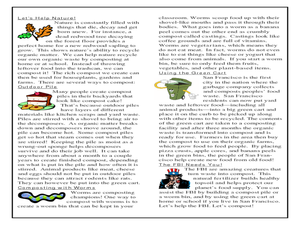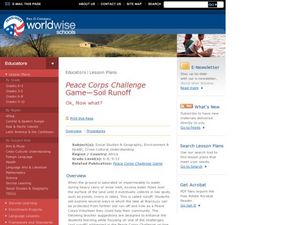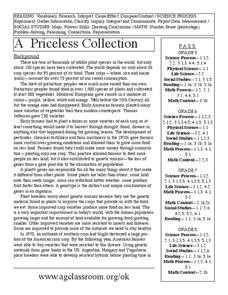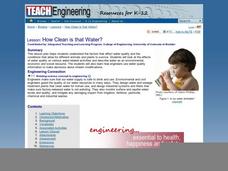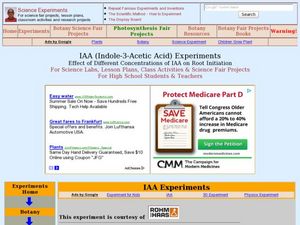SF Environment
Sort and Color!
Sorting is a very important skill that can be used in math and even science. Learners get familiar with some environmentally friendly vocabulary terms as they practice separating objects that can be recycled from those that can't. They...
Curated OER
Soil: Food Mapping
Pupils examine the concept of food mapping . In this agriculture instructional activity, students explore food and agriculture systems in the United States in the past and today. Pupils complete food mapping activities.
Teach Engineering
Basically Acids
Base your lesson plan on acids and bases on an informative resource. The first installment of a five-part module on the science behind Harry Potter has individuals investigate acid/base chemistry with the use of invisible inks. They also...
Curated OER
Let's Build a Worm Bin
Students explore the process of decomposition. In this ecology and measurement lesson, students prepare a worm home to be used for vermicomposting. Students weigh a group of worms and the added food, recording this information on a data...
Curated OER
Ocean Pollution
Learners explore ocean pollution. In this ecology lesson plan, students view a video entitled This Pretty Planet and identify common biodegradable products. Learners participate in activities designed to simulate the negative effects of...
Florida Department of Environmental Protection
Build Your Own Aquifer
Ever wondered how an aquifer works? Introduce your class to the amazing way many people get water by exploring how underground aquifers work. Two fun hands-on activities are used to help kids understand what an aquifer is, how it works,...
Curated OER
Peace Corps Challenge Game: Soil Runoff
Students examine the causes and effects of soil runoff. In this environment lesson, students look at ways in which soil runoff is controlled. Students then play a game and discuss how the Peace Corps deals with soil runoff in African...
Maryland Department of Natural Resources
Eyes on Dissolved Oxygen
Learn about the factors that affect the way oxygen dissolves in salt water with a chemistry lab. After studying the molecular structure of water, young scientists figure out how aeration, temperature, and organic waste affect dissolved...
Florida Department of Environmental Protection
Water's Journey Expedition
Step into a scientist's shoes to go online and discover the Florida Springs Expedition, and participate in two activities focusing on how humans impact the environment. The first activity asks scholars to summarize the six dispatches at...
Salt River Project
How Do We Clean Polluted Water?
How do we clean up oil spills and other pollutants in the water? Explore water treatment strategies with a set of environmental science experiments. Groups remove oil from water, work with wastewater treatment, and perform a water...
University of Southern California
Mastering Microbes
Small but mighty! Learners explore the role of microbes in a healthy ecosystem. An engaging lesson asks pupils to design an aquaponics system that demonstrates that healthy microbes are necessary to maintain the ecosystem.
Curated OER
THE FARMER CARES FOR THE LAND
Students will identify cause and effect relationships in issues relating to Agriculture and the environment.Ask students to describe what farmers do. Then ask students to define the word "environmentalist." Ask students if they have...
Curated OER
Florida's Springs
Young scholars calculate the water usage for irrigation of school grounds. They use maps in determining which areas are irrigated.
Curated OER
A Priceless Collection
Students read about and discuss life of Russian geneticist Nikolai Vavilov, define terms related to field of genetics, complete worksheets, conduct seed experiments, observe and record results, and locate seed banks on world map or globe.
Curated OER
Fan 3: Sort and Color!
Students explore the concept of recycling. In this environmental stewardship instructional activity, students discover how to recycle and compost. Students complete an activity that requires them to sort recyclable items.
Curated OER
A Priceless Collection
Students read and discuss the background of plants, seeds, and gene banks and grow seeds on their own. In this seeds lesson plan, students also use maps to identify seed banks and research plant farmers.
Curated OER
"Investigating Soil Color and Texture"
Ninth graders will identify/understand the differences between soil and dirt. They will classify soil color accurately and use Munsell notation to describe it (Munsell books provided).Students will classify soil texture using the feel...
Curated OER
How Clean is the Water?
Students read about and discuss water and how it is used as a resource and how engineers use technology to preserve it. In this water lesson plan, students look at a picture of water treatment and tell what is wrong with the picture.
Curated OER
Don't Let Hazardous Waste Be a Hazard to You!
In this recognizing hazardous waste worksheet, learners observe hazard signs, read informational passages, and unscramble the words to identify hazardous waste products. Students unscramble 4 words.
Curated OER
It's All About the Roots
Students investigate the process of hydroponic agriculture. They grow beans in different hydroponic solutions, compare results and graph their observations.
Curated OER
An Underground River
Seventh graders describe how water flows through the ground, what an aquifer is and what soil properties are used to predict groundwater flow. They consider the affects of pollution on groundwater supplies and write a letter drawing...
Curated OER
Where Does All the Water Go?
Students view a demonstration of how groundwater flows and define several related vocabulary terms. They complete a worksheet, participate in discussion and make a poster.
Curated OER
Why Eat Organic?
Ninth graders explore the concept of organic eating. In this environmental stewardship lesson, 9th graders compare and contrast organic foods with conventional foods and discuss the benefits of eating organic foods.
Curated OER
Auxin: Indole-3-Acetic Acid (AAA), A Hormone with Diverse Effects: Synthesis and Applications
Students synthesize Indole-3-Acetic acid from 3-indolylacetonitrile. For this biochemistry lesson, students determine the effect of different concentrations of IAA on lima beans. They explain how hormones help in plant development.





